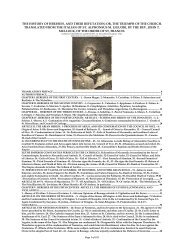The Writings of St. Francis of Assisi - + Saints' Works
The Writings of St. Francis of Assisi - + Saints' Works
The Writings of St. Francis of Assisi - + Saints' Works
Create successful ePaper yourself
Turn your PDF publications into a flip-book with our unique Google optimized e-Paper software.
THE WRITINGS OF ST. FRANCIS OF ASSISI<br />
And let that be more to you than a hermitage. 144 · And in this I want to know, if you love the Lord<br />
and myself, His servant and yours, if you have done this, namely, that there be no friar in the<br />
world, 145 who has sinned, as much as one could sin, that, after he has seen your eyes, never<br />
leaves without your mercy, if he seeks mercy. · And if he would not seek mercy, you are to ask<br />
him, if he wants mercy. · And if afterwards he would have sinned a thousand times before your<br />
eyes, love him more than me for this, so that you draw him to the Lord; and you are to always<br />
pity such ones. · And you are to announce this to the guardians, 146 when you will be able, that as<br />
far as you are concerned you are resolved to act thus.<br />
Moreover from all the chapters, which are in the Rule, which speak <strong>of</strong> mortal sins, with<br />
the Lord assisting (us) in the Chapter at Pentecost, 147 with the counsel <strong>of</strong> the friars, we shall make<br />
a chapter such as this: 148<br />
If one <strong>of</strong> the friars at the instigation <strong>of</strong> the enemy has sinned mortally, he is bound<br />
by obedience to have recourse to his own guardian. · And let all the friars, who<br />
know he has sinned, not shame him nor utter detraction, but let them have great<br />
mercy upon him and keep very private the sin <strong>of</strong> their brother; "because a doctor<br />
is not needed" by the healthy, "but by those who have a malady." (Mt 9:12) ·<br />
Similarly they are bound by obedience to send him to their custos 149 with a<br />
companion. · And let the custos himself mercifully provide for him, just as he<br />
himself would want to be provided for, if he was in an exactly similar situation. ·<br />
And if he has fallen into any venial sin, let him entrust the friar to his priest. 150 ·<br />
And if there is not a priest there, let him entrust him to his brother (companion),<br />
until he will find a priest, to absolve him canonically, just as has been said. · And<br />
those 151 (friars) are to have entirely no power <strong>of</strong> enjoining any penance except<br />
144 A reference to the desire to take refuge in a hermitage for the sake <strong>of</strong> the contemplative life;<br />
which in some persons is mixed with a desire to flee a cross which entails the practice <strong>of</strong> charity<br />
towards one's neighbor(s).<br />
145 Here, in contrast, <strong>St</strong>. <strong>Francis</strong> uses mundum, the Latin term for "world" in the spatial sense; it<br />
is equivalent to the Greek word "cosmos," which means "the world or universe."<br />
146 see the introduction to "<strong>The</strong> First Letter to the Custodes" [EpCust I] for an explanation <strong>of</strong> the<br />
<strong>of</strong>fice <strong>of</strong> Guardian.<br />
147 <strong>The</strong> General Chapter <strong>of</strong> the Friars Minor is held at Pentecost; cf. RegB VIII,2 and 5.<br />
148 K. Esser does not indent the paragraph which follows; this has been done by the English<br />
translator for clarity. <strong>The</strong> reader will want to compare this proposed chapter to RegNB XX and<br />
RegB VII. Indeed the affinity <strong>of</strong> this proposal to the cited chapter <strong>of</strong> the Regula Bullata, inclines<br />
to the conclusion that either this letter was written after 1221 A.D., or, if it was written before<br />
1221, as K. Esser holds, that despite this proposal's lack <strong>of</strong> approval by the Pentecost Chapter <strong>of</strong><br />
that year, <strong>St</strong>. <strong>Francis</strong> chose to refer to it when he composed the Regula Bullata in 1223 A.D..<br />
149 see the introduction to "<strong>The</strong> First Letter to the Custodes" [EpCust I] for an explanation <strong>of</strong> the<br />
<strong>of</strong>fice <strong>of</strong> Custos.<br />
150 i.e. his chaplain.<br />
151 <strong>The</strong> Latin word iste, translated here as "those," refers to the general subject (s) <strong>of</strong> the<br />
paragraph or to the antagonist: in this case: the guardian, the friars, and the custos. Unlike the<br />
Latin term hic, it does not necessarily refer to the protagonist, which in this case is "the friar who<br />
sinned," or to the specific subject <strong>of</strong> the immediately prior phrase or clause, which in this case is<br />
"the priest." Hence <strong>St</strong>. <strong>Francis</strong> is suggesting that neither the superiors nor the community impose<br />
Page - 47













